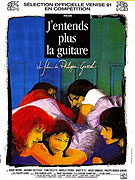
Regie:
Philippe GarrelKamera:
Caroline ChampetierMusik:
Faton CahenBesetzung:
Anouk Grinberg, Johanna ter Steege, Mireille Perrier, Brigitte Sy, Philippe Morier-Genoud, Yann Collette, Benoît Régent, Édith BoulogneInhalte(1)
I Can No Longer Hear the Guitar (J'entends plus la guitare) is Garrel's haunting tribute to his ten-year relationship with the iconic German chanteuse Nico. Johanna ter Steege plays the passionate, doomed lover of Benoit Regent. Caught in a self-destructive heroin haze, they drift together and apart as Regent struggles with his simultaneous desire for and repulsion towards a stable life. (Verleiher-Text)
(mehr)Kritiken (1)
It would be possible to sweep the matter off the table and say to Garrel that since the 1980s, other previously experimental authors have turned back to the script – indeed, Akerman and Schroeter are mentioned, for example. Although personally against excessive subjectivity, one cannot overlook the purely subjective turning point that this author hides with this gradual and increasingly progressive artistic counter-revolution: the breakup with the singer Nico, with his femme fatale... Much has been written about this. Of course, it is illegitimate and erroneous to analyze someone's psyche remotely, but if we can state the validity of the old Freudian distinction between healthy mourning and unhealthy melancholy in relation to a work of art that sublimates the author's libido through film, it is Garrel's films after The Secret Child. While mourning allows a person to eventually detach from the lost object of desire and move on, with melancholy it is the opposite and a person never unknowingly accepts the loss of the object: that is the fate of Garrel's films, constantly returning and revolving around the themes of love, separation, the death of a loved one, drugs, etc. After I Can No Longer Hear the Guitar, fittingly dedicated to Nico, only pure relational form remains in the 1990s: I would not be afraid to say that it is an empty form. Garrel seems unable to let go of what he cannot capture because it is no longer there, so he clings to the emptiness instead of using it fruitfully and moving on through it. We do not learn anything new about love, relationships, or loss; as viewers, we can only project ourselves onto the characters and insert our lives, assumptions, and clichés into theirs. In that, the story or plot returns to the scene: the classic bourgeois narrative stands precisely on the eternal covering up of emptiness, around which the wheels of the story turn - Garrel, however, unconsciously and unintentionally reveals the missing anchor of meaning...
()